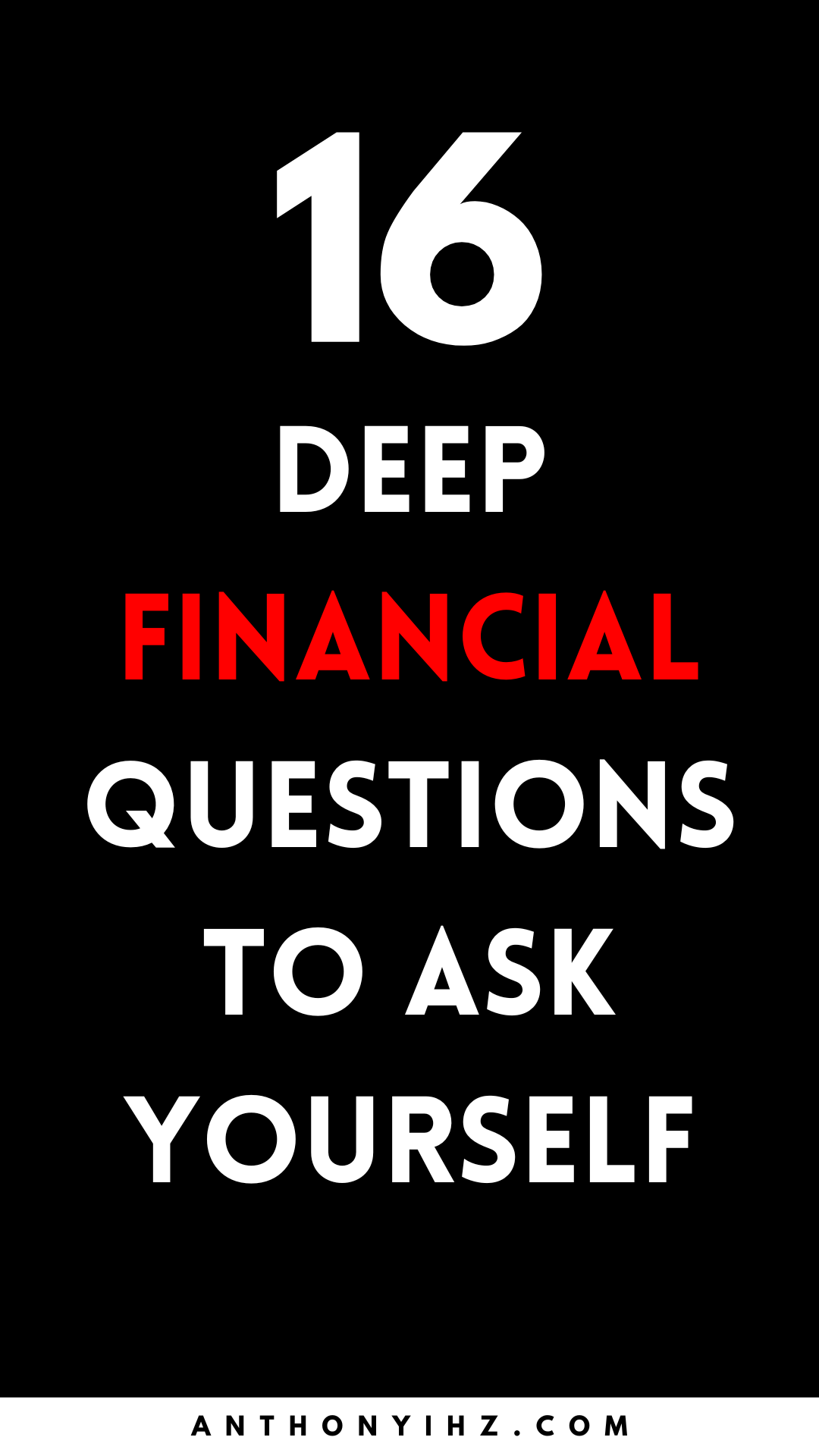
Sometimes, the best form of help we need is the unfiltered piece of advice we give ourselves, especially when it is tailored to the specific issues we want to resolve. So, when it comes to improving your finances, self-evaluation is very essential. You need to assess your methods of handling money and find the right financial questions to ask yourself.
By honestly questioning your habits, goals, and beliefs about money, you can put yourself on a clear path to financial progress. Each step of self-evaluation will bring more clarity and help you identify all the things you are getting wrong.
My main aim in this post is simple! I’m going to hand you a set of important financial questions to ask yourself. But more importantly, I will briefly analyze reasons why these questions are valid and how they can improve your game with managing money.
Why Do You Need To Ask Yourself Personal Finance Questions?
You need to ask yourself personal finance questions because that’s the only way you can separate reality from fantasy. What this means is that when you ask yourself the right questions, your eyes will be opened to all the possible mistakes that could ruin your financial life.
Ideally, questions have a way of compelling us to think outside the box and do things we don’t normally do. So, if you want to change your financial game plan and accomplish something more significant, you must begin by asking yourself some money-related questions.

16 Deep Questions To Ask Yourself To Change Your Finances Around
It’s high time you reflected on your past financial mistakes and figured out a way to move forward with your goals. The questions below are insightful inquiries into how you can become better at managing your finances, reaching your savings goals, paying down debt, and ultimately attaining financial freedom.
There’s no need to waste your time anymore. Let’s get right into every one of these financial questions to ask yourself:
1. What was the last money mistake I made?
It is important that you begin with this question because it’s probably the easiest to answer. In most cases, the most recent money mistake a person makes could be linked to impulse buying. We spend money almost every day on numerous purchases, so it’s not uncommon that we occasionally find ourselves buying things impulsively.
Notwithstanding, irrespective of what your last money mistake is, you must address it properly. Constantly remind yourself why it’s a bad money mistake and how it can hurt your finances. Be committed to taking the necessary steps to prevent that mistake from occurring again.
Doing this is a brilliant way to establish the fact that you’re ready to improve your personal finance. Moving forward, it will be easier to address other financial mistakes that are holding you back.
2. Do I have realistic savings goals?
Since saving money is an important aspect of your personal finance, this is certainly one of the deep financial questions to ask yourself. What are your savings goals and how realistic are they?
Usually, you should create savings goals for things like an emergency fund, college education for your kids, and of course, retirement. But if you don’t have a feasible plan to actualize these goals, your efforts could be futile.
Firstly, to make sure your savings goals are realistic or achievable, you should have a reliable stream of income. This could be a good-paying job or a profitable business you run all by yourself. Whatever it is, be sure that you are making a significant amount of money to cover your expenses and fund your goals.
Besides, set a timeframe for each goal, and don’t forget to track your progress as you work toward achieving it.
3. How do I spend my income?
Thinking about how you spend your income is one of the best financial questions to ask yourself. This brings us to budgeting.
If you don’t have a budget, there’s no way you can accurately tell how you used up your income throughout the month. It’s important to ensure that your money is being spent on the right expenses. You have to avoid overspending and don’t splurge your money on irrelevant purchases that aren’t planned for.
Building a budget is quite straightforward, especially when you’re budgeting to zero. A zero-based budget is a scenario where your total expenses equate to your total income, leaving you with $0. However, if you need help to pull this off, here is a guide to creating your own budget.
4. What plans do I have for my children’s education?
Your children could be very young at the moment, but that doesn’t change the fact they will be old enough to attend college in the future. As a responsible parent, you have to support your kids by paying some or all of their educational expenses when they get into college. So if you are going to achieve this, the plan has to start now.
If you need to save $30,000 for tuition fees, how much do you have to save every month to actualize that amount? Do the maths and figure out how realistic your goal is.
5. How do I live without debts?
This is one of the essential financial questions to ask yourself. This is because debt payments are a serious burden you need to lift off your shoulders as soon as possible. When you eliminate your debts successfully, you can conveniently focus on other financial goals.
So, the big question right now should be, what is the best debt pay-off strategy you can employ to become debt-free within a short period of time? You can choose to consolidate your debts, use the debt avalanche method, or even the debt snowball method.
However, if you are looking for a more detailed explanation on how to live debt-free, check out this post that discusses 10 amazing tips to help you stay out of debt.
6. When and how do I retire?
Retirement is inevitable except you work until all the organs in your body begin to fail. But if you desire to enjoy quality time with your spouse and explore your passions when you are much older, then you need to take your retirement plan very seriously. This makes it one of the most important personal finance questions to ask yourself.
The traditional way of planning for retirement would be to build a 401(k) account and save as much as you can. However, there’s an opportunity to achieve much more than that, especially if you are still young at the moment.
Explore diverse ways to invest your money, but be reasonable about your decisions. If you are going to invest in the stock market, do it wisely. If you are going to invest in real estate, make sure you partner with a legitimate establishment that can help you increase your profits significantly.
7. Do I have life insurance or other estate plans for my dependents?
This isn’t something you should be worried about if you are single and have no immediate family to look after. Even if you suddenly pass away, your funeral expenses can be covered by extended family members. However, if you are in a committed marriage and you have kids to cater to, then this is highly important.
When you eventually pass away, the only way to ensure that your dependents are financially secure is by leaving a solid life insurance policy. This is a major concern, especially as the provider for the family.
8. Do I have enough money to sort out emergencies?
This is one of the key questions to ask yourself about your finances. The one thing everyone knows about an “emergency” is that you don’t expect it. You can’t specifically tell when it comes. But just because it’s unpredictable doesn’t mean you can’t be prepared for it.
Emergencies are the little living costs that spring up in a situation where you suddenly lose your job, become too ill to work, or find yourself in a pandemic like the recent COVID-19.
When you have an emergency fund, it’s easier to cope in such desperate situations. Hence, a part of your savings must be contributed to possible emergencies. Ideally, every household should have enough money in an emergency fund to cover at least 3 months of living expenses.
9. When will I attain financial freedom?
Having a good job that enables you to pay your bills, make mortgage payments, and go on vacation once in 5 years doesn’t mean you have financial freedom. If you lose your job, for example, you’ll be desperate to find another because that’s your only income stream.
Financial freedom is a scenario where you never have to worry about money even if you don’t have a “job”. So, one of the sensible financial questions to ask yourself is, “When will I stop worrying about money?”
To attain financial freedom is not rocket science. You simply have to build your finances to the point where you no longer rely on salary to thrive. This means you have to invest in assets that will serve as passive income streams forever.
10. If I could go back in time, is there anything I would change about my personal finance?
This is one of the important financial planning questions to ask yourself. To create a plan for the future, you also need to evaluate your past, so you don’t repeat some mistakes that could sabotage your plan.
So, it’s time you started asking what you could have done better if you had the chance. This doesn’t mean you can change the past. It’s impossible. However, this will put you in a better state of mind to prepare for the future.
11. What would I do if I’m given $10 million?
You probably have a thousand things you want to get with your money after pondering on this question. Do you want to buy a yacht? Do you want to go on vacation in the fanciest cities? As much as these things are good and will make you happier, you need to hold your horses and think about other profitable things you could do with that money.
There are various investment opportunities you wouldn’t miss if you had $10 million. That’s the direction you should think toward.
12. How would I start afresh if my entire finances crumbled overnight?
Not too many people think about this but it remains one of the deep financial questions to ask yourself. Do you have any plans to put your life back together if you lose all your financial resources? You probably won’t have an ultimate answer to this question. However, each time you remind yourself of this, you will be compelled to act more carefully and be wise with the money decisions you make.
On the other hand, pondering on a question like this should encourage you to think about possible ways to secure your finances.
13. What decisions would I make if I wasn’t afraid of the future?
Most times we limit our goals and undermine our abilities because we are too scared to do something daring. We do things that are within our reach and forget to go the extra mile to achieve a remarkable feat. So, it’s time to examine one of the important financial questions to ask yourself – what would you do differently if you were brave enough?
When you get your answer, proceed by carving out the necessary steps that would lead you to accomplish that goal courageously. This isn’t about being careless. It’s about having the boldness to do things that are seemingly scary yet could change your finances for the better.
14. What future would I have if I continue with my current habits?
If you don’t want to be financially stagnant, this is one of the money questions to ask yourself. We have different habits. In fact, our habits are like the building blocks that make up the kind of person we are. But to become a better person and improve the quality of your life, you must let go of bad habits.
Evaluate your actions and find out if there’s a pattern of bad habits that is affecting your financial growth. These bad money habits could be impulse buying, eating out too often, or not building a budget. Think about all the benefits you’ll get if only you switch to the good side.
15. What are my big financial goals?
Everyone is meant to have a set of money goals that are supposed to be achieved within a specific timeframe. So, one of the most relevant financial questions to ask yourself is if you have the right set of big goals centered on money.
For example, you definitely want to retire someday. You would also love to live in your own home in the future. You would love to support your kids through college after high school. These are long-term financial goals every responsible adult and parent should have.
Aside from thinking about these goals, you should also create a plan for how to achieve them. Goals without plans will always remain “goals”. Only an actionable plan transforms a goal into a reality for you.
16. What do I own now that I wouldn’t have bought with its current market value?
If you make impulse purchases regularly, you certainly own some things right now that you don’t need or use. However, there’s no need to be sad about it, especially if those items have increased in value. They can be sold, giving you an extra income to put toward your financial goals.
Although it can be difficult to let go of possessions you are emotionally connected to, you have to make rational decisions rather than act impulsively.
Final Thoughts On Deep Financial Questions To Ask Yourself
There are countless questions that will change your finances. But if you look at this post more deeply, you will realize that all these questions address significant issues that surround your personal finance. From debt payments to budgeting, and of course, building an emergency fund, these questions have something vital to remind you of.
Nevertheless, if you are a deep thinker and you have some money questions you couldn’t find here, do well to share them in the comments.
Pin this for later!


